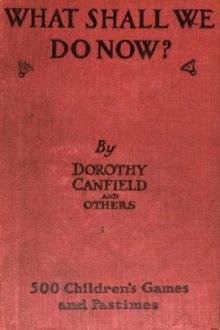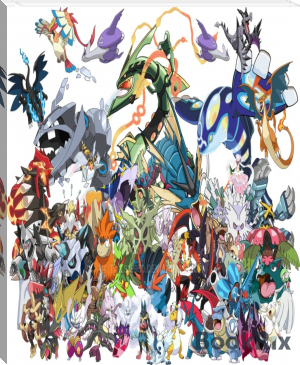What Shall We Do Now? - Dorothy Canfield Fisher (scary books to read .TXT) 📗

- Author: Dorothy Canfield Fisher
- Performer: -
Book online «What Shall We Do Now? - Dorothy Canfield Fisher (scary books to read .TXT) 📗». Author Dorothy Canfield Fisher
The yellow bunting (or yellow hammer) can be a pet; and he has the sweetest little whispering song. If you have a caged bunting, his seed should be soaked in cold water for some hours before it is given to him, and he must have the yoke of a hard-boiled egg, meal-worms, ants' eggs, and any insects you can catch for him. He must also have plenty of opportunities for bathing, and as much fresh air without draughts as possible.
The BlackbirdThe blackbird is delicate when caged and must have plenty of nutritious food, bread and milk, boiled vegetables, ripe fruit, insects, and snails. He is a thirsty bird and needs plenty of water.
Birds of all kinds especially like cocoanut (though they will come to the window-sill simply for bread crumbs). The cocoanut should be sawn in two, and a hole bored through each half, about an inch from the edge. A strong string is then threaded in and they are hung from the bough of a tree. They should be hung rather high up, on a bough reaching as far out from the trunk as possible, so as to avoid all risk from the cat. The birds frequent elm-trees more than any others, because the rough bark contains many insects, but you may choose any kind of tree, as close to your windows as you like. The birds will keep pecking at the cocoanut all day long and will soon want a new one. If you have no tree near the house you might fasten a cord across the outer frame of your window and tie the pieces of nut to that. The birds would soon find out the cocoa-nut and come to it, and bread crumbs could also be put on the window-sill to attract them. Or, if you have a veranda, they could be hung up there, if you could make them safe from the cat. Mrs. Earle, in her book More Pot-Pourri from a Surrey Garden, gives elaborate directions for an arrangement in a veranda or balcony of cocoanuts, etc., for the birds. Lumps of fat will do as well as cocoanut. Some birds also greatly love a bone to pick at—an uncooked one with plenty of fat on it, which the butcher will probably be glad to give you if you ask him and explain its purpose. It can be hung up in a tree or merely laid on the window-sill.
The RobinIn the ordinary way one would not keep robins at all. They are so tame and fond of the company of human beings that they will come regularly to the door for crumbs every morning and never be far off at any time. But if a wounded robin is found or a nest is abandoned (probably owing to the death of the mother at the cat's hands) just before the young birds are ready to fly, you might pop them in a cage. They do not often thrive long in captivity, even if the confinement does not seem irksome, but to keep one until it was strong enough to be let loose would be a kindness. Still there have been many cases of happy tame robins. The best food for them is bread crumbs, grated carrot, yoke of egg and sponge-cake mixed together, the carrot making the mixture moist enough. A few insects daily are advisable. Robins are such quarrelsome birds that it is impossible to keep two of them in an aviary, or even to keep one robin with birds weaker than himself. Perhaps the best way to treat a pet robin is to let him fly all over the house in the winter. He may one day fly away altogether in the spring, but if he is alive he is almost certain to come back again when the cold weather begins.
Garden RobinsRobins in the garden are so pretty, so cheeky, so sweetly musical, and are so friendly to man (in spite of their arrogance and selfishness among birds) that they ought to be encouraged. As the only way of encouraging wild birds is to feed them, we have to try and give them what they like best. Robins are quite content with bread crumbs only. They will eat sop if they can get nothing else; but they prefer crumbs, and not too dry. For an especial treat they like fat bacon beyond everything: cooked bacon, that has been boiled, not fried. It should be mixed up very small, and the bread also crumbled into tiny morsels, for robins like to eat very nicely and daintily. Robins are pleased to have crumbs given them all the seasons through, though in the autumn they can very well take care of themselves.
Each robin has his own special domain, which any other robin invades at his peril. The robins that come to the window for food are those that belong to that particular side of the house and no other. This means that there are other robins is different parts of the garden which will have to be fed in their own special localities. You will soon find out where these are, even if you have not already been guided to them by their songs. Robins like their food scattered always in the same place, or under the same tree, and, as nearly as you can, at the same time. Then you will find them on the lookout for you, and if you take always the same basket (a rather shallow flat one which stands firmly) and, putting it on the ground, go a few steps away, you will see them hop into it. After a few days they will probably get tame enough to come into the basket while it is in your hand; only you must have a little patience at first, and hold it very still, and of course you must not have previously scattered any food on the ground.
Birds in the GardenThis brings us to the other garden birds which we have no wish to put in cages, but which it is well to be as kind to as possible. In winter, when there is a frost, to feed them is absolutely necessary; but at all times it is well that they should know that you are not enemies (of which they have so many), but their friends. The following notes, together with the foregoing passage on feeding robins, on birds in the garden have been prepared far this book:—
"Birds are grateful all the year through for a shallow pan of water, which they can drink from and use also as a bath. And the bees, too, will be glad to come and get a sip of water, for they also are thirsty things. A small round yellow earthenware pan is excellent for the thrushes and blackbirds, but it is as well to provide a smaller one, say an ordinary shallow pie-dish, for the robins and little birds. These should be refilled twice a day, at least, in summer time. You can place the pans on the grass or path, where you can see them comfortably from the house, but not nearer than you can help, because the blackbirds are rather shy, and it would be a pity to make drinking too great an adventure for them.
"Birds are thankful for a little feeding right through the spring, both when the mother bird is sitting on the nest and the father has to forage for two, and when the young ones are hatched and there are at once many more mouths to fill. In the summer too, if it should be unduly wet and cold, or unduly hot and dry, and grubs and insects scarce, the young birds are pleased to find a meal ready for them. But in the winter it is a positive duty to feed the birds; for remember that when the ground is covered with snow, or frozen hard, they can get no insects, and thus, after all the berries have gone, they will starve unless they are helped with other food.
"Almost every household has enough waste scraps, if they are collected carefully, to give the birds a good meal once a day. Bread, of course, will form the chief part, but nothing comes amiss to them, however tiny. Morsels of suet, dripping, shreds of fat, meat, and fish, and cheese rind also, all mixed up together, are an especial treat. The mince should be well mixed with the bread crumbs, or all may not get a fair share. Crusts, or any hard, dry bits of bread, can be scalded into sop (though, unlike chickens, wild birds do not seem to like it hot), and a little piece of dripping or fat, soaked with the sop, makes it more tasty for them. If the supply of bread be short, the birds will be very pleased with chickens' rice. It should be the 'second quality' kind, in the brown husk, which can be procured from most corn-dealers. But this is hardly necessary excepting in a long hard frost. Starlings are especially fond of bones, and they will esteem it a favor if any which have been used in making soup, and are not required for the dog, are thrown out to them on the ground. Their joyous chattering over them is quite cheering, even on the dreariest winter's day. They are also grateful for the rind of a ham or piece of bacon, after it has been boiled. This should be thrown out to them whole, not cut up in little pieces. They are equally fond of the bones and skin remains of a 'dried' haddock.
"For the bolder birds, such as robins, you will like to put some food on the window-sills, and also on the path or grass close to the house. But remember the more timid ones, and scatter it in other parts of the garden as well.
"Sparrows, of course, deserve their food as well as any of the others; but it is rather hard to see them taking every morning much more than their share, while the less courageous or impudent birds (who also sing to you) get none. It seems impossible to prevent this, though Mr. Phil. Robinson, in his book Garden, Orchard, and Spinney (in the chapter entitled 'The Famine is my Garden'), recommends scattering some oatmeal mixed with a few bread crumbs on one side of the house, to keep the sparrows occupied, whilst you feed the other birds elsewhere. Sparrows, however, have a way of being on every side of the house at once. Still, if you feed your birds daily, and as nearly at the same time as possible (they like it as soon as may be after your own breakfast), you will find them on the lookout for you, and they will manage to get a good share, if they all start fair, in spite of the sparrows. In a hard frost they are thankful for a second meal, but it should not be later than two o'clock, because birds go to bed very early in cold weather, and the food would be





Comments (0)